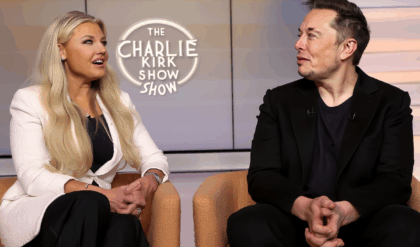Jodie Foster, a name synonymous with Hollywood excellence, has lived a life under the spotlight since she was just three years old. From her debut in a Coppertone commercial to her iconic roles in Taxi Driver and The Silence of the Lambs, Foster’s career is a testament to her talent and resilience. But behind the glamour of her success lies a lesser-known story of pressure and responsibility that defined her childhood. In a revealing interview with The Atlantic in February 2024, Foster opened up about the immense burden she felt as a child star, admitting, “I was it. There was no other income besides me.” This stark reality shaped her early years, forcing her to navigate fame, family expectations, and a longing for normalcy in a world where she was the sole breadwinner.
A Star Is Born—At a Cost
Born Alicia Christian Foster on November 19, 1962, in Los Angeles, Jodie was the youngest of four siblings. Her parents, Evelyn Ella “Brandy” Foster and Lucius Fisher Foster III, divorced before she was born, leaving Brandy to raise the children with her partner in a modest Los Angeles home. Money was tight, and opportunities were scarce—until Jodie’s unexpected entry into show business. At three, she accompanied her older brother Buddy to an audition and caught the eye of casting agents. What began as a fluke turned into a lifeline for the Foster family. That Coppertone commercial marked the start of Jodie’s career—and her role as the family’s primary provider.
By the time she was in first grade, Jodie was supporting her mother and three siblings—Lucinda, Constance, and Buddy—through her acting gigs. “I was it,” she told The Atlantic. “There was no other income besides me.” Her mother, Brandy, who doubled as her manager, leaned heavily on Jodie’s earnings, often expressing financial panic that weighed on the young girl. In an industry notorious for exploiting child stars, Jodie’s situation was compounded by the emotional burden of knowing her family’s survival depended on her. She wasn’t just a child playing roles; she was a child carrying the weight of her household.
The Spotlight and the Shadows
Jodie’s early career was a whirlwind of activity. By age six, she was appearing in television shows like Mayberry R.F.D., Gunsmoke, and The Courtship of Eddie’s Father. She voiced Pugsley Addams in The Addams Family animated series and starred in the short-lived Paper Moon series in 1974. Her talent was undeniable—she taught herself to read by three, spoke fluent French after attending Lycée Français de Los Angeles, and displayed a maturity that belied her years. But this maturity came at a cost. While other children played, Jodie worked, her childhood consumed by auditions, sets, and the pressure to perform.
Her breakout role came at 14 in Martin Scorsese’s Taxi Driver (1976), where she played Iris Steensma, a teenage sex worker. The role earned her an Oscar nomination for Best Supporting Actress, cementing her status as a rising star. Yet, behind the accolades, Jodie yearned for normalcy. She told The Atlantic about a documentary crew that followed her at 13, an experience she despised but felt obligated to endure. “I didn’t like it, but I didn’t turn down because I felt it was part of my duty to my career and family,” she said. The pressure was palpable—she couldn’t say no, not when her earnings were the family’s lifeline.
One particularly poignant memory she shared was begging her mother to keep the crew away from a Disneyland trip. “I just wanted to be a child for once, with no one paying attention to me,” she recalled. The constant scrutiny, coupled with her role as the breadwinner, left little room for a carefree childhood. Acting, however, became an unexpected refuge. “She couldn’t get inside my body and take that experience from me,” Jodie said of her mother. On set, away from Brandy’s watchful eye, she found a sliver of privacy—a rare space where she could be herself, unburdened by familial expectations.
A Mother’s Influence, A Child’s Struggle
Brandy Foster was a formidable presence in Jodie’s life, serving as both parent and manager until Jodie was in her twenties. Described as a “force of nature” by those who knew her, Brandy was a publicist before dedicating herself to her children’s careers, particularly Jodie’s. But her dual role created a complex dynamic. “I was bred to be [my mother’s] partner,” Jodie told PorterEdit in 2018. “My whole life was with my mom, traveling on the road together, going to see French movies and German movies, and talking about why they worked and why they didn’t.” While this fostered Jodie’s intellectual growth, it also placed her in a position of adult responsibility far too soon.
Brandy’s financial stress became Jodie’s burden. In her 2024 Atlantic interview, Jodie described how her mother’s panic about money was directed at her, the child who had no choice but to keep working. “There was no other income besides me,” she reiterated, a statement that underscores the gravity of her role. This pressure wasn’t just financial—it was emotional. Jodie later reflected on the fear of abandonment that drove her to succeed. “You operate on this primordial thing: ‘If [Mom] goes crazy, or is in a heap on the floor, or if she doesn’t have any money, she is going to leave me,’” she told PorterEdit. For Jodie, failure wasn’t an option; her family’s stability depended on her success.
Despite the strain, Jodie’s relationship with her mother was layered with love and mutual respect. Brandy, who passed away in 2019 at 90, was a fierce advocate for her daughter, steering her through Hollywood’s pitfalls. In a statement after her mother’s death, Jodie and her siblings called Brandy “the strongest person her family has ever met, a champion, a fighter, full of fire and love.” But that fire came with expectations, and for Jodie, it meant sacrificing parts of her childhood to fulfill them.
The Loneliness of Stardom
Jodie’s career trajectory is a study in resilience. After Taxi Driver, she starred in films like Freaky Friday (1976) and Candleshoe (1977), balancing her work with her education. She graduated from Yale University in 1985 with a degree in literature, a testament to her determination to carve out an identity beyond acting. But her college years weren’t without turmoil. In 1981, John Hinckley Jr.’s attempt to assassinate President Ronald Reagan—motivated by his obsession with Jodie and Taxi Driver—thrust her into a media storm, further reinforcing her desire for privacy.
Her roles often mirrored her inner solitude. From Clarice Starling in The Silence of the Lambs (1991) to Dr. Ellie Arroway in Contact (1997), Jodie gravitated toward characters who were solitary women under pressure. “I keep finding myself wanting the elegance of that,” she told The Atlantic, describing her tendency to strip away extraneous relationships in her roles, leaving her characters on solitary journeys. This mirrored her own experience as a child star, where she felt isolated by her responsibilities and the fame that followed.
“There’s a deliciousness to loneliness,” she said, reflecting on a moment on the set of The Brave One (2007). “There is nothing like the loneliness of lying in a pool of fake blood at three in the morning in Prospect Park with 175 people around you moving things—and knowing they will never understand what you’re going through.” For Jodie, acting became a paradoxical space where she could be alone yet seen, a way to process the isolation of her childhood while shielding her true self from the world.
A Protective Legacy
Now 62, Jodie Foster has transformed her experiences into a source of strength and empathy. She’s a two-time Oscar winner, a director, and a producer, with a net worth of $100 million as of 2025. Her recent roles in Nyad (2023) and True Detective: Night Country (2024) earned her critical acclaim, including her first Emmy Award. But perhaps her most meaningful role is that of a mother to her sons, Charles, 26, and Kit, 23, whom she shares with her former partner, Cydney Bernard. Married to Alexandra Hedison since 2014, Jodie has prioritized her children’s privacy, a direct response to her own lack of it as a child.
In her 2024 Elle interview for the Women in Hollywood issue, Jodie expressed a protective instinct toward younger actresses. “I find myself reaching out to girls who could be my daughters and saying, ‘Wait a minute, you keep doing dumb things on publicity tours. What’s going on with you?’” she said. “I do have this really big soft spot for the young actresses who came up as young people, because I just don’t know how they survive without some mother around the way I had a mom around.” Her words reflect a desire to shield others from the pressures she faced, offering the maternal guidance she sometimes longed for.
A Journey of Balance
Jodie Foster’s story is one of extraordinary talent and quiet endurance. The pressure of being her family’s sole breadwinner as a child shaped her in profound ways, driving her to succeed while teaching her the value of privacy and resilience. Her career, spanning over five decades, is a testament to her ability to navigate Hollywood on her terms, turning childhood burdens into a legacy of strength. As she continues to act, direct, and mentor, Jodie remains a beacon of authenticity, proving that even under the weight of immense responsibility, one can find a path to personal fulfillment—and perhaps, a little bit of peace.





